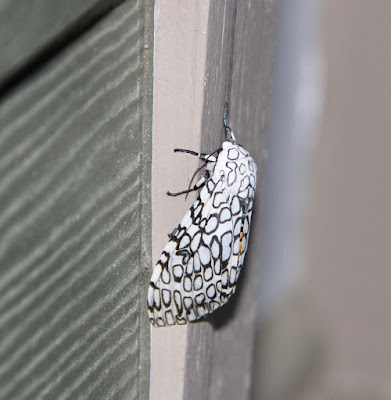 |
| giant leopard moth
Photo by J. Harrington
|
Last year, about this time, is the first time I remember seeing a giant leopard moth. More common, or at least I've seen them more frequently, are the White Admiral (Limenitis arthemis arthemis) AKA Red-spotted Admiral butterflies. We've already seen a couple of swallowtails but, based on the photos from previous years, don't expect to see any monarchs for two or three weeks.
 |
| white admiral butterfly
Photo by J. Harrington
|
A very few grasshoppers have hopped through the fields as we walked them. Many common milkweed plants are about half a foot or more high and starting to emerge from the surrounding grasses. The fact that we're starting to get some warmth and sun to supplant may's cool, wet weather should help the plants grow and blossom, which, in turn, should help the insects that feed and lay eggs on them.
As Minnesota often does with her weather, she's overcompensating for May by jumping to the mid to upper eighties this afternoon. Our plants and animals, and humans, have to adapt to both extremes of temperatures and precipitation in all seasons as well as rapid transitions between many of our seasons. If the distributions about our mean weather factors were more limited, we could start to challenge San Diego but without the threat of earthquakes.
I, Up they soar
I Up they soar, the planet’s butterflies, pigments from the warm body of the earth, cinnabar, ochre, phosphor yellow, gold a swarm of basic elements aloft. Is this flickering of wings only a shoal of light particles, a quirk of perception? Is it the dreamed summer hour of my childhood shattered as by lightning lost in time? No, this is the angel of light, who can paint himself as dark mnemosyne Apollo, as copper, hawkmoth, swallowtail. I see them with my blurred understanding as feathers in the coverlet of haze in Brajcino Valley’s noon-hot air.
********************************************
Thanks for visiting. Come again when you can.
Please be kind to each other while you can.
No comments:
Post a Comment